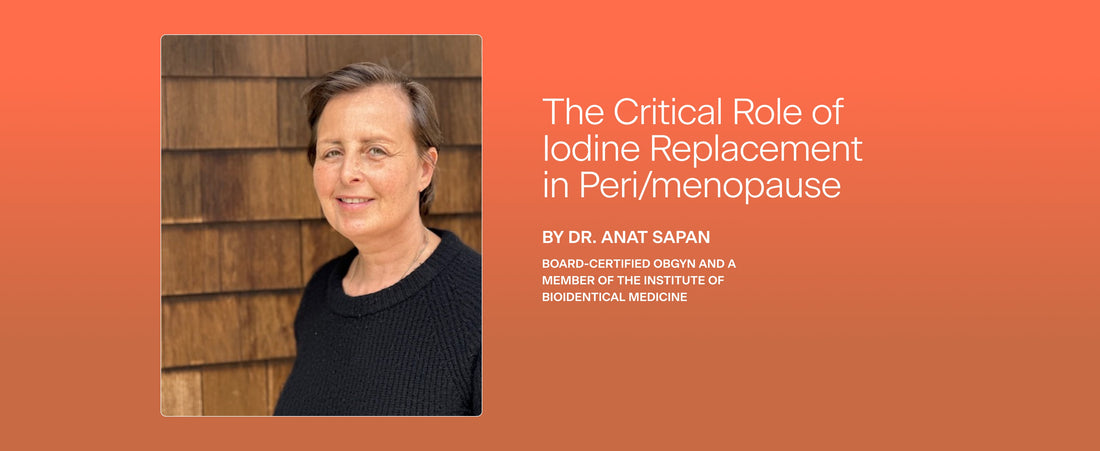By Dr. Anat Sapan
Board-certified OBGYN and a member of the Institute of Bioidentical Medicine.
As a menopause specialist, I’m here to tell you about the critical importance of supplementing iodine during your peri/menopause journey, and the broader, concerning implications of iodine deficiency in today's world.
Iodine, an essential mineral found in certain foods (like seaweed), plays a critical role in various bodily functions regulated by thyroid hormones. An iodine deficiency, which results from an iodine-poor diet, can lead to significant and debilitating health issues.
Rootless Daily Bites are formulated with 5 seaweed species to provide you with 100% of your daily dose of iodine and a diveristy of micronutrients you can only find in the sea. (Did we mention that they also give you more daily energy?)
Iodine and Its Essential Functions
Every single cell in your body uses iodine.
Iodine is vital for the production of thyroid hormones, thyroxine (T4) and triiodothyronine (T3), which regulate your metabolism, energy levels, and protein synthesis. Thyroid hormones are critical not just for maintaining metabolic rate but also for bodily growth and development in all life stages.
In particular, Iodine is pivotal for fetal and child brain development. Insufficient iodine during pregnancy has been correlated with intellectual disabilities and stunted growth in children. During childhood, cognitive function is also heavily dependent on iodine, where an iodine deficiency can lead to severe intellectual disabilities. In adulthood, iodine helps to prevent goiter, an enlargement of the thyroid gland caused by iodine deficiency, and other diseases of the thyroid.
Iodine also has antimicrobial properties that aid in treating minor infections and disinfecting water.
Iodine Deficiency: A Global Concern
Despite its importance, iodine deficiency is a widespread issue that affects people of all ages. One of the main reasons for this is the pervasive presence of iodine-displacing substances in our environment. We live in a toxic world where exposure to plastics, food additives, fluoride, chloride, and bromide is commonplace. These substances can displace iodine from our bodies, exacerbating the deficiency.
The global iodine deficiency has far-reaching consequences. Thyroid dysfunction is one of the most direct outcomes, but the issue goes beyond the thyroid gland. Studies have linked iodine deficiency to increased rates of various cancers, including thyroid, pancreatic, breast, and prostate cancer. These alarming trends underscore the critical need for adequate iodine intake across all age groups.
Iodine is absolutely essential to maintaining metabolism and regular energy. The Daily Bites provide 100% of your daily dose of iodine.
The Perimenopause Journey and Iodine
Perimenopause, the transitional phase leading up to menopause, brings about significant hormonal changes that can affect a woman's health and well-being in a variety of ways. During this period, Iodine becomes increasingly crucial. Here’s why:
- Thyroid Function and Metabolism: Perimenopausal women often experience changes in metabolism and energy levels. Iodine's role in thyroid hormone production helps regulate these functions, potentially alleviating common symptoms such as fatigue and weight gain.
- Cellular Function: As mentioned, iodine is used by all cells in the body. This makes it essential for maintaining overall cellular health and function during perimenopause, a time when cellular processes may already be under stress due to hormonal fluctuations.
- Cancer Prevention: Given the increased risk of certain cancers associated with iodine deficiency, ensuring adequate iodine intake during perimenopause is a preventive measure. This is particularly important considering the higher incidence of breast cancer in postmenopausal women.
Seaweed: A Natural Source of Iodine
One of the most potent natural sources of iodine is seaweed. In addition to being the most bioavailable source of iodine, seaweed also contains a variety of vitamins, minerals, antioxidants, and prebiotics that contribute to overall health. Here are some of the benefits of incorporating seaweed into your diet:
- Thyroid Health: Seaweed's high iodine content supports thyroid hormone production, which is crucial for regulating metabolism and energy levels.
- Gut Health: The prebiotics and polyphenols in seaweed support a healthy gut microbiome, which is essential for overall digestive health.
- Heart Health: Antioxidants in seaweed help reduce inflammation and oxidative stress, contributing to cardiovascular health.
The Daily Bites are the most delicious way to get your thyroid humming and boost energy and metabolism.
Addressing Iodine Deficiency
To address iodine deficiency, consider the following strategies:
- Dietary Sources: Incorporate iodine-rich foods into your diet. In addition to seaweed, other good sources include fish, dairy products, and iodized salt.
- Supplementation: In cases where dietary intake is insufficient, iodine supplements can be beneficial. However, it's important to consult with a healthcare provider before starting any supplementation regimen.
- Environmental Awareness: Reduce exposure to iodine-displacing substances like fluoride, chloride, and bromide. Opt for natural and organic products when possible and be mindful of the additives in your food and water. Consider taking an iodine supplement before entering any chlorinated body of water.
Try Rootless Daily Bites to fuel your thyroid with the essential iodine it needs each and every day.
Conclusion
Iodine replacement is imperative for overall health, especially during the perimenopause journey. The widespread deficiency of this essential mineral has serious health implications, from thyroid dysfunction to increased cancer risks. By ensuring adequate iodine intake through dietary sources like seaweed and reducing exposure to harmful substances, we can support our thyroid function, enhance our cellular health, and mitigate the risks associated with iodine deficiency.
